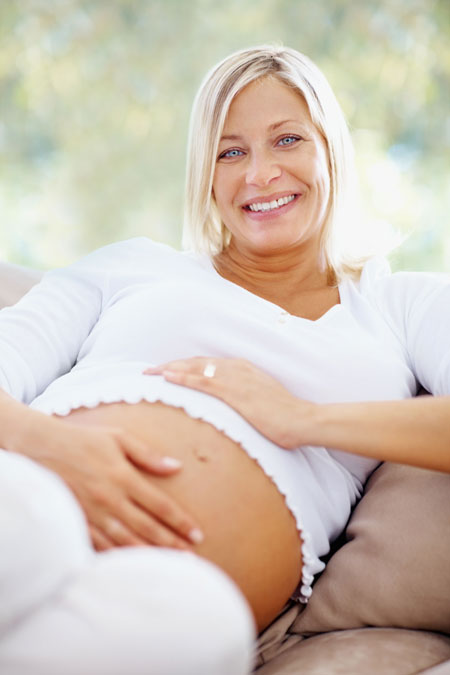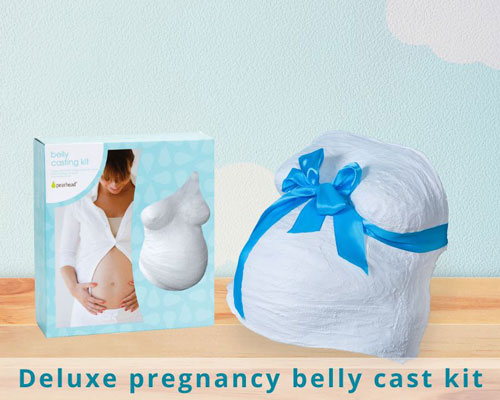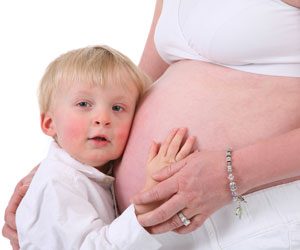 As an older mother myself, having just given birth to a baby girl eight weeks before I turned forty, I find myself sensitive to all the expert opinions on the subject. During my pregnancy some of the comments I received made me wonder if I should just book into a retirement home at the same time I booked in for my antenatal care. I even considered the ultimate defence, lying about my age but this was made difficult when my seven-year-old daughter kept telling everyone about my impending, rather significant birthday. Frankly, I would prefer to follow the mantra, ‘breed old, die late and leave a beautiful brain.’ As a midwife, however, I was mindful of some of my increased risks and was grateful to have the knowledge to make informed decisions that resulted in the birth of a healthy baby.
As an older mother myself, having just given birth to a baby girl eight weeks before I turned forty, I find myself sensitive to all the expert opinions on the subject. During my pregnancy some of the comments I received made me wonder if I should just book into a retirement home at the same time I booked in for my antenatal care. I even considered the ultimate defence, lying about my age but this was made difficult when my seven-year-old daughter kept telling everyone about my impending, rather significant birthday. Frankly, I would prefer to follow the mantra, ‘breed old, die late and leave a beautiful brain.’ As a midwife, however, I was mindful of some of my increased risks and was grateful to have the knowledge to make informed decisions that resulted in the birth of a healthy baby.
Women who give birth later in life do so for a variety of reasons.
Some have chosen to establish their careers first or to ensure financial security before embarking on motherhood. Others may not have found a partner until later on in life while others may have had difficult childhoods that they need to resolve before they become parents themselves. There are also increasing numbers of women who have undergone years of fertility treatment in order to have a baby.
Older mothers are defined as women who become pregnant and give birth at 35 years and over. Far from being a minority anymore, we are fast becoming a majority. In Australia in 2004, women had on average 1.77 babies. This is the highest fertility rate since 1995. This rise was seen largely among women who were aged between 30-39 years of age. For the first time, women aged between 35 and 39 years of age are having more babies than women aged between 20 and 24 years of age. The average age of all women giving birth in Australia is now 30.6 years of age and the average age of fathers is 32.8 years of age.
What problems can older mothers encounter?
Is age a problem when it comes to pregnancy and birth or is the problem people’s attitude to age? Being an older mother has pros and cons that are supported by good scientific evidence. But, there is no doubt that people’s attitudes to older mothers can in fact generate problems. Research has shown that where there are no identified medical complications of pregnancy, the risks of childbirth in older women are no greater than in younger women. This is an important consideration because health professionals can create a self-fulfilling prophecy when they become anxious and intervene or perceive problems.
Older mothers are more likely to be induced and have their labours sped up.
They are most likely to have a caesarean section even when you exclude problems. The older body is less supple and flexible. This may partly account for the increased need to intervene in birth. It is interesting to note, however, that older women who give birth at home or in a birth centre are much more likely to have a normal birth than those that receive a more medicalised approach.
While research into pregnancy and birth for older mothers does tend to confirm the view that women aged 35 and over are more prone to complications it is important to take underlying health issues into consideration. For example, the older we get the more likely we are to be overweight and suffer from problems such as high blood pressure and diabetes. This adds risk to any pregnancy we then have. If a risk factor exists before we go into labour then this can impact the labour and increase the need for medical intervention.
Unfortunately, high-profile examples, such as Madonna, who had her last child at 42, and Cherie Blair, Prime Minister Tony Blair’s wife, who gave birth at the age of 45, make women think age is not an obstacle to their fertility. The reality is that for women over 35 getting pregnant is often the hardest part. Fertility declines as we get older but the drop is quite dramatic after 35. Women release fewer eggs as they get older. These eggs are less likely to be fertilised or to implant in the uterus and grow a healthy baby.
As good as you may look on the outside, and even feel on the inside, your eggs are as old as you are.
If you attempt IVF it is also less successful in women over 35- and if successful more likely to end in miscarriage. On the other hand, twins are more common in older mothers (non-identical). While this is partly due to the increased use of fertility treatments by these women, the likelihood of naturally conceived twins peaks between ages 35 and 39.
The rate of miscarriage in older women is significantly greater than in younger women. Studies have found that about 9 percent of recognised pregnancies for women aged 20 to 24 ended in miscarriage. The risk rises to about 20 percent at age 35 to 39, and more than 50 percent by age 42. This is mainly due to the increased risk of chromosomal abnormalities that occur with age. Older mothers are also more likely to have ectopic pregnancies. Sadly the risk of stillbirth is also increased, though some studies provide evidence that disputes this.
Older mothers are more likely to have bleeding before pregnancy.
This is mostly due to the way the placenta implants lower in the uterus. Older mothers are more likely to have babies that are born premature and that are in a breech position. They are also more likely to have children born with a chromosomal abnormality. Despite the increased risk of abnormality, it is important to remember that the vast majority of babies are normal. The incidence of Down syndrome is much higher in women over 35 years of age. Yet, the majority of babies with Down syndrome are born to women younger than 35 years of age. It is because they are less likely to have testing for it.
Stamina does decline as we grow older. A screaming newborn at 3 am will not leave you as unaffected by minimal sleep the next day as it would have in your 20s. Older mothers tend to have developed comfortable routines and a level of independence in their lives, so the 24-hour-a-day responsibilities that come with caring for a child can be a shock. Women in this older age group also are used to a higher wage than their younger counterparts and can feel the effects of lost income or a break in careers.
Surveys have shown that women over the age of 35 suffer most when it comes to trying to juggle family life with a job. New mothers get less than an average of four hours of sleep in the first four months of their baby’s life and this affects relationships and work performance. The key is to take as much maternity and paternity leave as possible.
What are the advantages of having children later in life?
One could argue that the biological disadvantage of having babies later on in life is balanced by social advantages. Older mothers are more likely to be educated and financially secure. Older mothers are often more settled in themselves and readily make the necessary sacrifices that having a baby brings. Children of older parents are more likely to do well at school than those born to very young parents. Both these factors can lead to positive effects on the child.
Interestingly, older mothers are more likely to give birth to children who are left-handed. People who are left-handed tend to achieve more than right-handed people. This is because their brain is structured in a way that widens their range of abilities. Lots of actors, for example, are left-handed. Older women have more confidence in their bodies and in themselves. They are more likely to negotiate the care they want for themselves and their babies. The added years and life experience can give us extra courage and resilience, which are vital for motherhood.
Women who are able to have children later in life may also live longer. Research indicates that women who have one or two children in their 30s and 40s have a greater chance of living into their 80s and 90s. One study found that women who lived until at least the age of 100 were four times more likely to have had children in their 40s than women who survived only to the age of 73. The researchers concluded that the genes that allowed a woman to give birth later in life might also slow the rate of aging and decrease their susceptibility to diseases in old age.
The other benefit of pregnancy and lactation at any age is they are supposed to make us smarter. Changes occur that appear to mark the brain for life, suggesting women’s brains are much more capable of change than men’s. As if any of us doubted that!
Can women over 35 years of age reduce their risk?
At any age, a woman should consult her healthcare provider before trying to conceive. A preconception visit helps ensure that she is in the best possible physical condition before conception. This is especially important for women who have chronic health problems. Examples are diabetes or high blood pressure, which can be harmful to them and their babies. These conditions are much more common in women in their late 30s and 40s than in younger women. Careful medical monitoring and appropriate choice of medications, starting before conception and continuing throughout pregnancy, can reduce the risks associated with these conditions and, in most cases, result in a healthy pregnancy and birth.
Having a healthy diet, undertaking regular exercise and maintaining a healthy weight is important. Taking folic acid 400 micrograms daily before and during the first 12 weeks of pregnancy can help prevent serious birth defects. If women smoke then they should try to give up or dramatically cut down. Smoking will have an enormous impact on the health of the baby. Smoking is linked to premature births, unhealthily small babies and more miscarriages and bleeding in pregnancy. It is also linked to stillbirth and later on to sudden infant death syndrome. Likewise, it is best to avoid alcohol during pregnancy. Also, do not use any drugs unless recommended by a health professional.
What about older fathers?
There is so much focus on older mothers in the media and by the medical profession that older fathers are hardly ever mentioned except in the context of their amazing virility. There are some risks with fathering children later in life, with an increase in rare birth disorders and schizophrenia in offspring. Women with older partners are also likely to take longer to conceive.
Do older mothers need special medical care?
Having a child between 25 and 35 years of age is probably ideal but it is not always desirable or possible. Having a baby between 35 and 45 years of age is still reasonably safe in Australia. Pregnancy after 45 years of age becomes the domain of the very healthy and very wealthy. Women who are healthy with no medical problems will need the same care as any other pregnant woman. The only additional considerations will be genetic counselling and testing for abnormalities in early pregnancy. It is important therefore that women book in early for antenatal care. There is no reason why older mothers cannot have their baby in a birth centre or at home if this is their choice and everything is straightforward in the pregnancy.
As an older parent myself, I have had the advantage of watching and learning from the mistakes friends made raising their children. As an older parent, I can regale my children with stories of travel and adventure from my well-spent twenties. But as an older parent, I also feel a tug at the heartstrings when I consider that I won’t be with my children as long nor perhaps see as many grandchildren as some of my friends will. But then I can honestly say, I wouldn’t change a thing.
Disadvantages
Advantages
|
Good book
‘Older Mothers’ by Julia Berryman, Karen Thorpe and Kate Windbridge
Websites
Just type in ‘older mother ‘and plenty of websites are available.




Really appreciate your post….encouraging and informative!